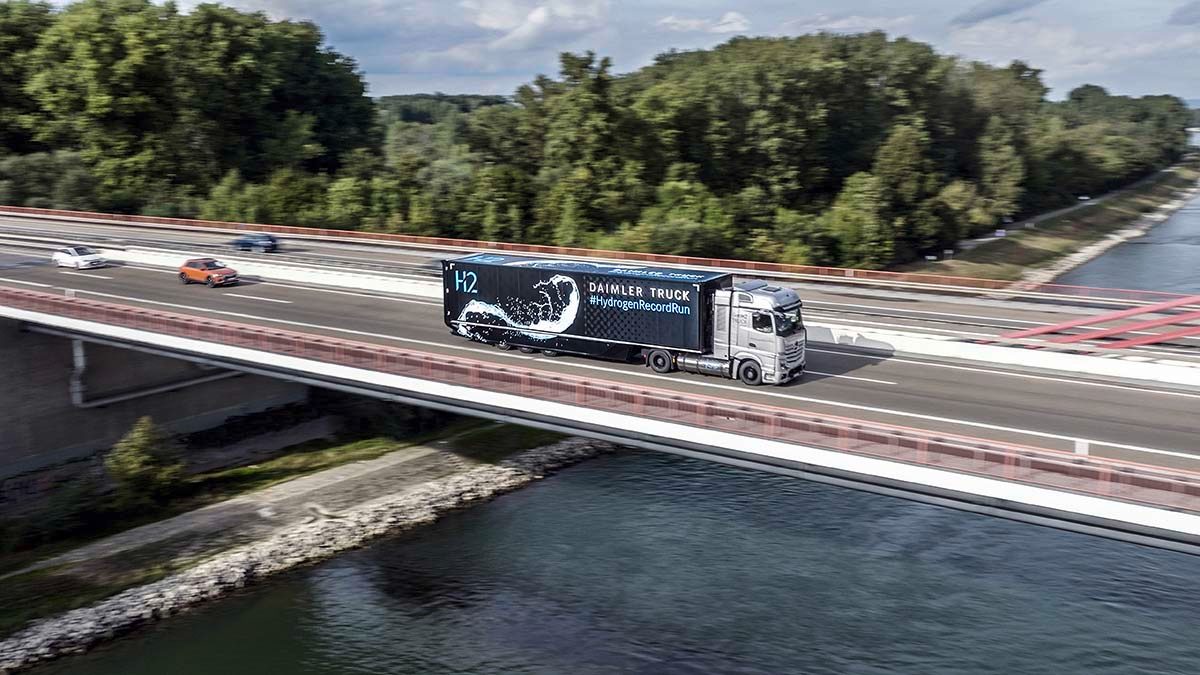Mercedes-Benz GenH2 Truck cracks 1000km mark

A public road-approved prototype of the Mercedes-Benz GenH2 Truck has achieved a record distance covering 1047km with one fill of liquid hydrogen.
Powered by a cellcentric fuel-cell system and equipped with a liquid hydrogen fuel tank system, the run started at Mercedes-Benz Truck’s Customer Center in Wörth am Rhein and finished in Berlin.
With a GVM of 40 tonnes, the vehicle completed the run fully loaded under real-life conditions, with no CO2 emitted during the entire run.
The record drive with sealed tanks and controlled mileage was independently confirmed by an inspection document from TÜV Rheinland.
After the successful run, Andreas Gorbach, Member of the Board of Management of Daimler Truck AG, Head of Truck Technology, drove the truck across the finish line in the Ministergarten in Berlin.
“To decarbonise transport, we need both battery-electric and hydrogen-powered drive technologies,” he said.
“The sweet spot for fuel cell trucks lies in flexible and demanding long haul transportation tasks. By cracking the 1000-kilometre mark with one fill, we have now impressively demonstrated hydrogen in trucks is anything but hot air, and we are making very good progress on the road to series production,” said Gorbach.
“At the same time, our record run today is a reminder that decarbonising transportation requires two other factors in addition to the right drive technologies – a green energy infrastructure and competitive costs compared to conventional vehicles.”
Ahead of the run, the Mercedes-Benz GenH2 Truck was fuelled with liquid hydrogen at Daimler Truck’s filling station at the company’s development and testing centre in Wörth.
The hydrogen was supplied by Air Liquide and is reportedly of renewable origin.
During the refuelling process, cryogenic liquid hydrogen at -253°C was filled into two 40kg tanks mounted on either side of the truck chassis.
Because the vehicle tanks have exceptional insulation, the hydrogen can be kept at temperature for a sufficiently long time without active cooling. Both tanks were sealed before the start of the drive to TÜV Rheinland.
Daimler Truck prefers liquid hydrogen in the development of hydrogen-based drives.
In this aggregate state the energy carrier has a significantly higher energy density in relation to volume compared to gaseous hydrogen.
As a result, “more hydrogen can be carried, which significantly increases the range and enables comparable performance of the vehicle with that of a conventional diesel truck,” the company said.
The first fuel-cell trucks are expected to be tested in customer hands in the coming years, while the goal remains firmly set to introduce the series version of the Mercedes-Benz GenH2 Truck in the second half of the decade.





